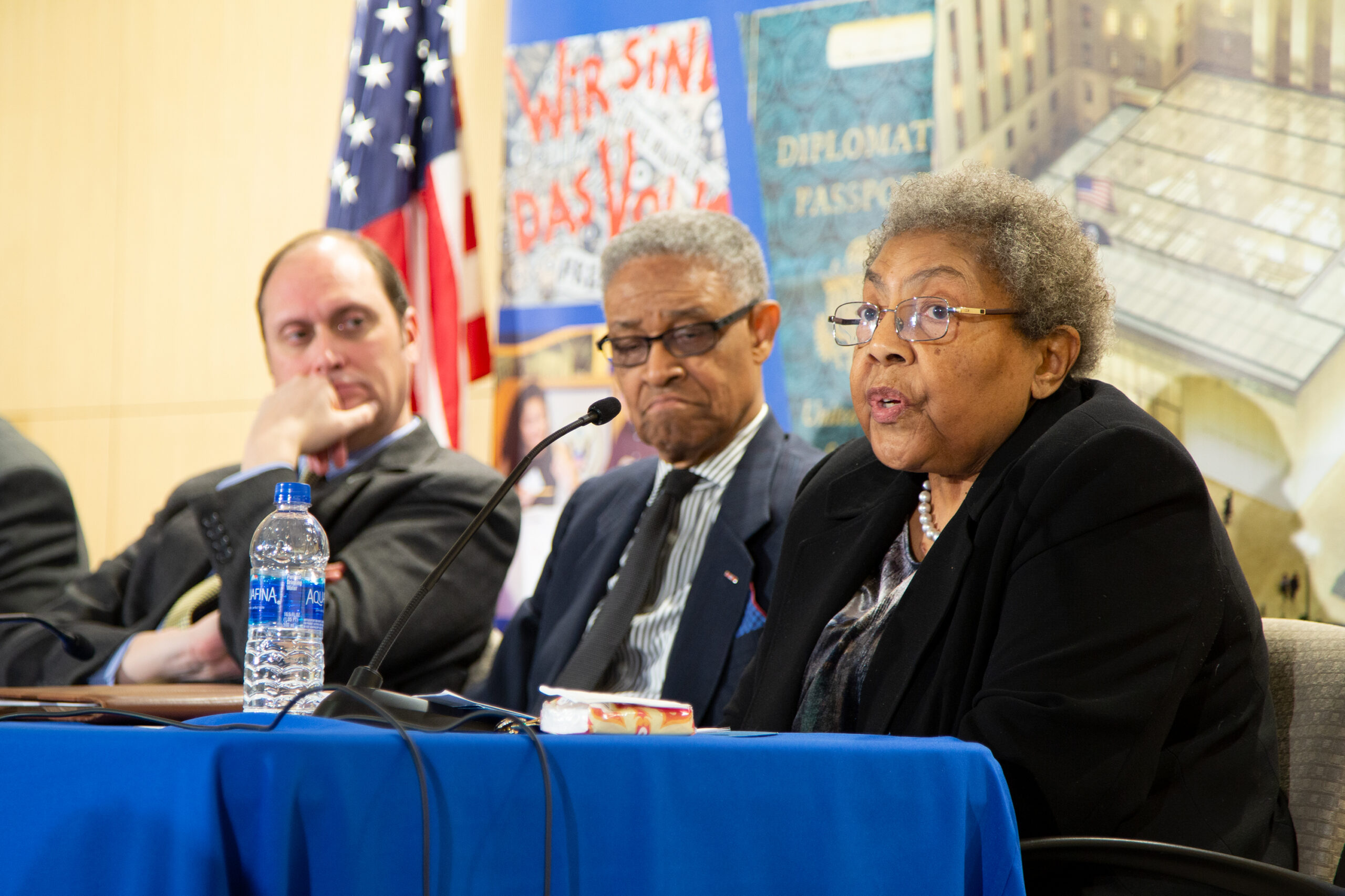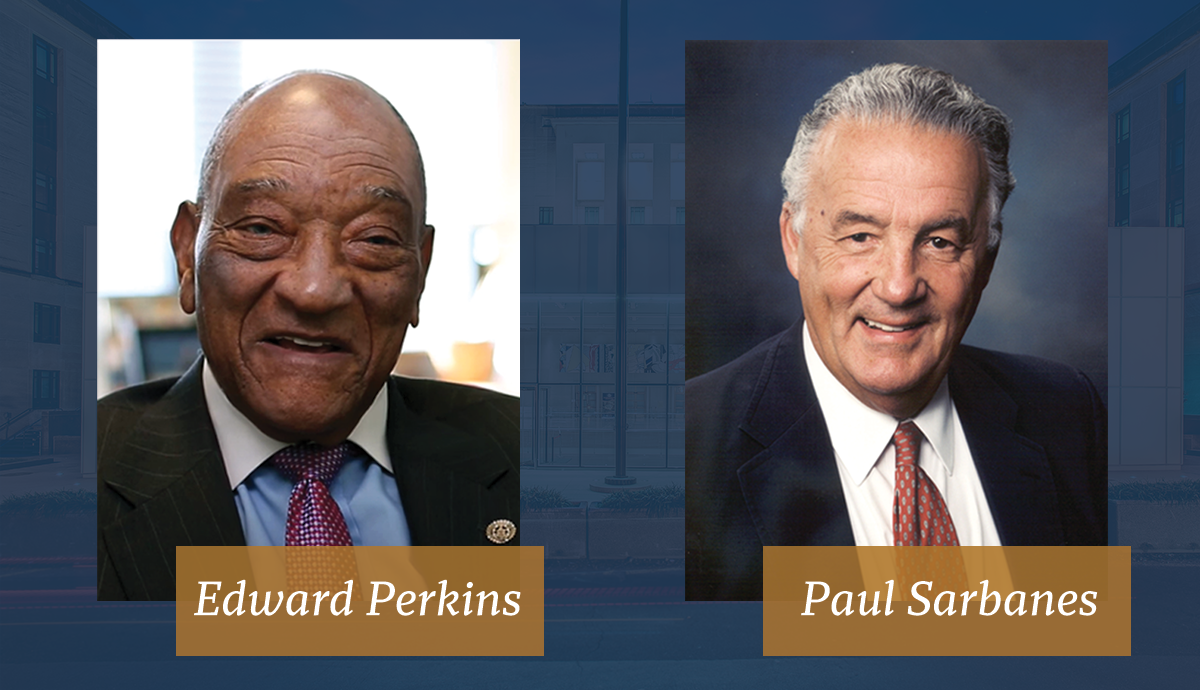Ambassador Edward Perkins (1928-2020) and Senator Paul Sarbanes (1933-2020) were two dedicated public servants whose careers and devotion to country have benefitted American diplomacy and the federal government. With the passing of both Ambassador Perkins and Senator Sarbanes in 2020, the Diplomacy Center Foundation reflects on the legacy of two important members of the Foundation’s leadership.
Edward Perkins
Edward Perkins joined the Foreign Service in 1971. He first began working in the Office of the Director General of the Foreign Service, followed by assignments in the Bureau of Personnel, the Bureau of Far East and South Asian Affairs, and the Office of Management Operations. In 1978, Ambassador Perkins was a counselor for political affairs at the US embassy in Accra, Ghana, and, in 1981, became the deputy chief of mission in Monrovia, Liberia. In 1983, he became the director of West Africa Affairs. Ambassador Perkins was appointed his first ambassadorship in 1985 to Liberia.
One of Ambassador Perkins’s most notable years of service was from 1986 to 1989, when he was the first Black ambassador to South Africa. Ambassador Perkins’ appointment overlapped with the last decade of apartheid—a system of institutionalized racial segregation that lasted in South Africa from 1948 until the early 1990s. The United States’ response to apartheid was a significant foreign policy issue. From 1992 to 1993, Ambassador Perkins served as ambassador to the United Nations.
Ambassador Perkins also left a lasting legacy with his dedication to diversifying the US Foreign Service, which had been overwhelmingly white and male at the time. As director general of the Foreign Service from 1989 to 1992, he helped recruit people of color, women, and individuals from underrepresented groups to the Foreign Service. His responsibilities included overseeing the hiring of individuals like Avraham Rabby (1942-2020), who became the first blind person in 1989 to join the diplomatic corps.
Ambassador Perkins retired from the Foreign Service in 1996 with the rank of career minister. In retirement, Ambassador Perkins was the first executive director for the University of Oklahoma’s International Programs Center, continuing his legacy of service to American diplomacy. Ambassador Perkins joined the Diplomacy Center Foundation donor family in 2019 as part of our Founding Ambassadors Society. That same year, he also became a Diplomacy Center Foundation trustee.
Jim Dandridge, vice chair of the Diplomacy Center Foundation Board of Directors, remembers his last conversation with Ambassador Perkins:
We had a lengthy phone conversation, in which he shared his excitement over the upcoming publication of his book. Many of the stories within that book are ones he has told me at one time or another, including recounting his prior private conversation with President Ronald Reagan on his consideration for appointment as the US ambassador to South Africa. The character of his conversation with President Reagan was a description of a plain-talking, to the point diplomat who gained the President’s confidence in that single, rather lengthy private conversation.
I characterize Ambassador Perkins as a forthright diplomat before, during, and after his Foreign Service career. He was a keen evaluator of people and issues, with an equally keen empathetic ability. As Ambassador Ruth Davis recounted during the State Department’s recent memorial service, Ambassador Perkins was a mighty oak in this forest of humanity.
Paul Sarbanes
Paul Sarbanes had a 40-year career dedicated to serving Marylanders. In 1967, he joined the Maryland House of Delegates, representing the 2nd district. He was elected to the US House of Representatives in 1971 to represent Maryland’s 4th district and reelected in 1973 from the 3rd district. In 1977, Senator Sarbanes began his 30-year career as a US senator for Maryland. During his senate career, he served on several Senate committees: banking, housing, and urban affairs; special Whitewater; foreign relations; budget; and joint economic committees.
Some of the most significant periods of Senator Sarbanes’s service were at the beginning and the end of his career with the federal government. As a US representative in his third year in office, then-Representative Sarbanes composed and introduced the first of three articles of impeachment against President Richard Nixon for obstruction of justice as a ranking member of the US Senate Whitewater Committee.
In 2002, Senator Sarbanes sponsored the Public Company Accounting Reform and Investor Protection Act, also known as the Sarbanes-Oxley Act, which was created following the 2001 financial accounting scandal involving the Enron Corporation energy company. The Sarbanes-Oxley Act expanded or set new requirements for business practices to promote corporate responsibility, enhance financial disclosures, and prevent corporate and accounting fraud. Today, the Sarbanes-Oxley Act remains an important law that governs the securities industry.
Senator Sarbanes was a founding director of the Diplomacy Center Foundation when it was established in 1999 as the Foreign Affairs Museum Council. In 2017, he became a trustee of the Foundation. Ambassador William Harrop, a Diplomacy Center Foundation board director, reflects on Senator Sarbanes’s contributions to American diplomacy:
While Senator Sarbanes was best known for his legislation that reformed the legal structure of public corporations, he consistently supported American diplomacy and the Foreign Service throughout his long Senate career. He disapproved of the spoils system, under which campaign contributors are awarded ambassadorial appointments, and he publicly opposed and voted against the confirmation of unqualified nominees.
From the beginning of the Diplomacy Center Foundation’s history, Senator Sarbanes was an active participant in our board meetings for over a decade. Even long into his retirement—when his health did not allow him to serve on nonprofit boards—he continued to serve as a trustee, believing that a national museum dedicated to American diplomacy was long overdue.


